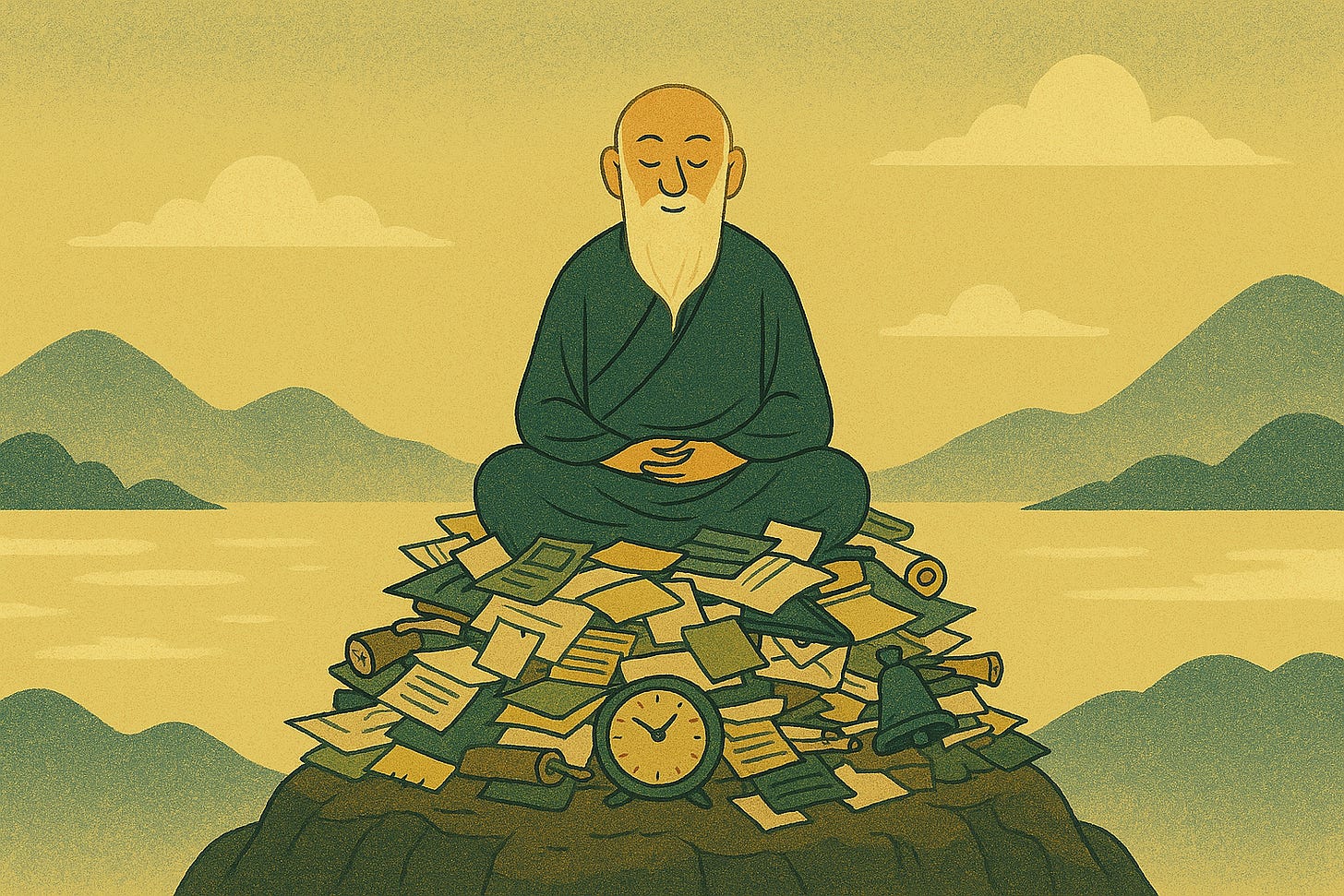Balance has become a marketing slogan.
We hear about “work-life balance,” “balanced diets,” “balanced opinions” — yet the lived reality tells a different story. Most of us feel stretched, fragmented, always on the verge of too much or not enough.
We live in a pendulum of extremes: overwork and burnout, hyper-connectivity and digital fatigue, emotional excess and numbness.
The deeper paradox is this: we crave balance, yet we often pursue it with the same intensity that caused our imbalance.
Our culture tends to picture balance as a static state: a perfect alignment, a zero-point between two forces. We seek it like a final destination: a place where tension dissolves, where decisions become easy, where we can finally breathe.
But balance in nature — and in the self — is not stillness. It is rhythm.
Balance is not the absence of movement, but the coordination of opposites in motion.
The Taoists offer us an image that shifts this understanding: Yin and Yang: Light and dark, effort and rest, expression and silence — continuously generating and transforming each other.
As the Tao Te Ching (Chapter 2) says:
“Being and non-being give rise to each other. Difficult and easy complete each other. Long and short define each other. High and low depend on each other.”
In other words: opposites do not cancel out — they require one another. This is not balance as a compromise, but balance as creative polarity.
Tyranny of Will
At the heart of Taoist wisdom lies the concept of Wu Wei (無為) — or “non-action.” Wu Wei refers to non-coercive action — action that does not violate the nature of things.
It’s a direct critique of the modern obsession with control: the belief that everything, from one’s productivity to emotions, relationships, even one’s identity, must be engineered, optimized, and fine-tuned. The Taoist sage rejects this.
Wu Wei is the antidote to burnout.
It tells us that not all problems are to be solved by greater effort. That sometimes, clarity emerges not by adding more, but by subtracting. That a pause is not procrastination, but a form of precision.
Where Taoism invites us to loosen our grip on control, Confucianism brings us back to discernment and responsibility. If Taoism is the wisdom of nature, Confucianism is the wisdom of the cultivated human being in society.
The Confucian concept of Zhong Yong (中庸), known as the Doctrine of the Mean, is often misunderstood as mediocrity or indecision. In fact, it is an ethical stance of dynamic moderation — finding the “just right” in every situation:
Not too much, not too little. Not overreaction, not apathy. Not self-erasure, not self-assertion.
Confucius said:
“Perfect is the virtue which is according to the Mean. Rare are those who attain to it.”
Zhong Yong is a daily moral effort to stay inwardly aligned while being outwardly responsive. It is deeply relational: you find balance not in isolation, but in how you stand in the world, in the family, in community.
It’s not about escaping life’s tensions, but learning to tune your instrument within them.
Balance, then, is not a matter of management — but of seeing clearly.
When we accept that all things arise and pass — sensations, moods, relationships, identities — we begin to act from a place of equanimity rather than fear.
Not Just Too Much — But Misaligned
Too often, we interpret imbalance as excess: too much stress, too many tasks, too much noise. But excess is not the root. The root is misalignment.
We work beyond our energy, speak beyond our truth, connect without presence, consume without hunger.
Balance is not the absence of extremes, but the presence of coherence. A congruence between inner rhythm and outer expression.
Instead of asking how can I do more in less time, ask:
How can I act with less friction, more truth?
Where am I out of sync with what I truly value?
Where am I resisting a flow that wants to carry me forward — or hold me still?
2 practical practices for rebalancing
The Pause of Three Breaths
Before reacting — to conflict, to urgency, to feedback — take three full breaths.
Feel what arises before responding. Often, you’ll choose differently.The “Enough” Check
Each evening, ask yourself:
Where today did I go too far? Where did I hold back too much?
Take 5 minutes to Journal. Observe patterns over time. (“The Flow Journal” might help you in this path, it is a simple and free resource available on my ko-fi page used by already 100+ of my readers !)
Ultimately, balance is not something we achieve. It’s something we renew, again and again.
It is not a place we arrive at, but a relationship we maintain — between body and mind, self and world, action and rest, clarity and compassion.
May we stop trying to master life as a system.
And begin to move through it as a practice.
Thank you for your support,
With Gratitude.



I would love to learn more about Comfucius and other Chinese philosophies. Would you be able to write more about these things too??
I love all your posts!
"Wu Wei refers to non-coercive action — action that does not violate the nature of things."...
...because it comes from the nature of things.